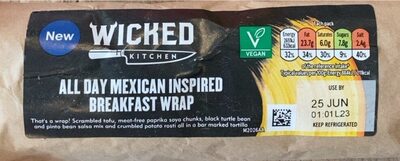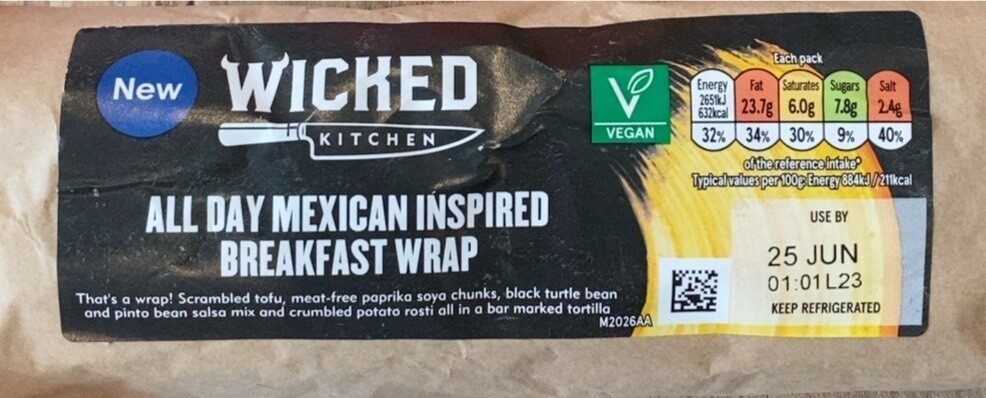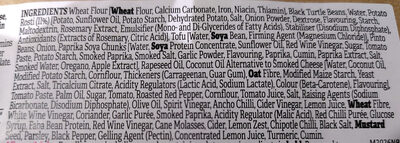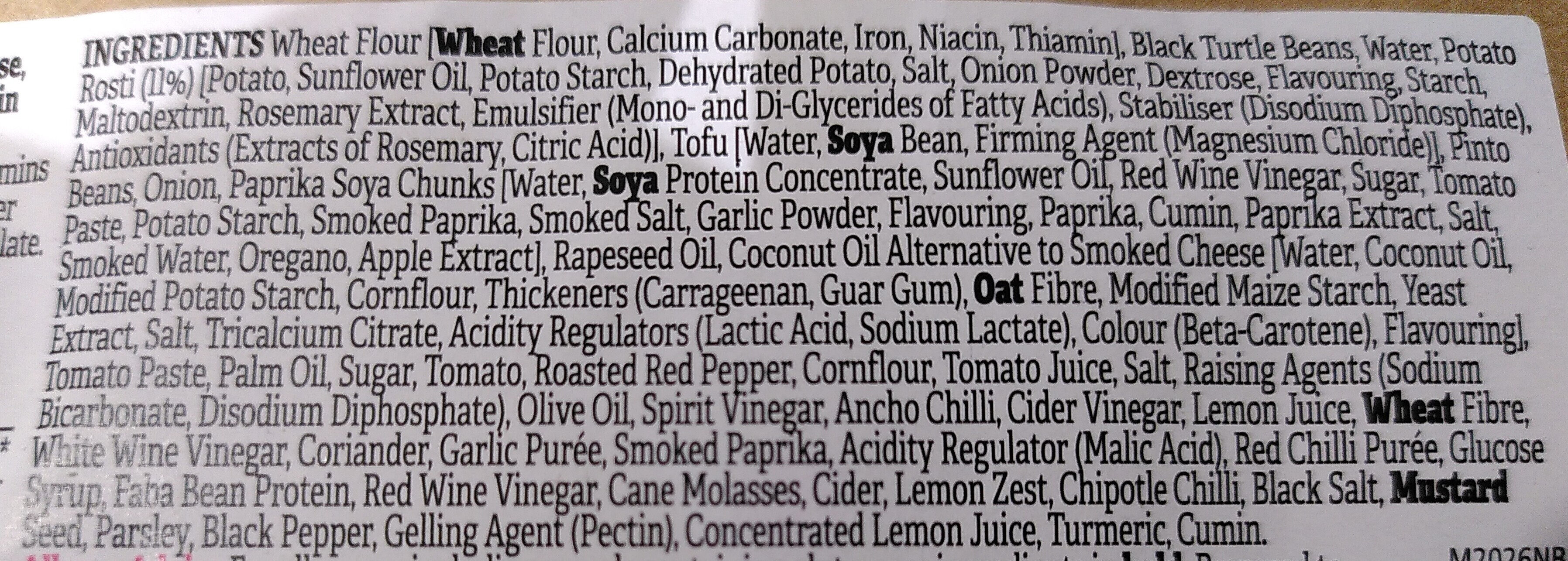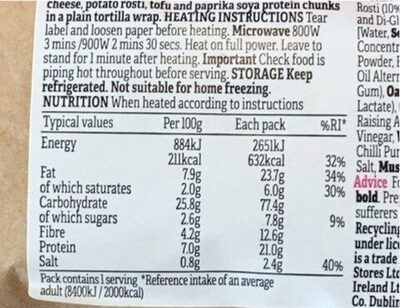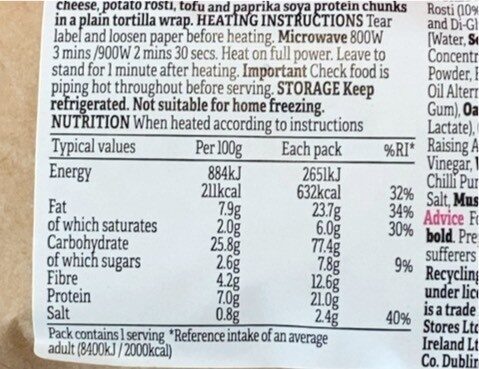Help us make food transparency the norm!
As a non-profit organization, we depend on your donations to continue informing consumers around the world about what they eat.
The food revolution starts with you!
All day Mexican inspired breakfast wrap - Tesco - 300 g
All day Mexican inspired breakfast wrap - Tesco - 300 g
This product page is not complete. You can help to complete it by editing it and adding more data from the photos we have, or by taking more photos using the app for Android or iPhone/iPad. Thank you!
×
Barcode: 5057753914837 (EAN / EAN-13)
Quantity: 300 g
Brands: Tesco
Categories: Sandwiches, Wraps
Labels, certifications, awards: Vegetarian, Vegan
Stores: Tesco
Countries where sold: United Kingdom
Matching with your preferences
Health
Ingredients
-
113 ingredients
Wheat Flour [Wheat Flour, Calcium Carbonate, Iron, Niacin, Thiamin), Black Turtle Beans, Water, Potato Rosti (11%) [Potato, Sunflower Oil, Potato Starch, Dehydrated Potato, Salt, Onion Powder, Dextrose, Flavouring, Starch, Maltodextrin, Rosemary Extract, Emulsifier (Mono - and Di-Glycerides of Fatty Acids), Stabiliser (Disodium Diphosphate), mins Antioxidants (Extracts of Rosemary, Citric Acid)], Tofu [Water, Soya Bean, Firming Agent (Magnesium Chloride)], Pinto Beans, Onion, Paprika Soya Chunks [Water, Soya Protein Concentrate, Sunflower Oil, Red Wine Vinegar, Sugar, Tomato ate Paste, Potato Starch, Smoked Paprika, Smoked Salt, Garlic Powder, Flavouring, Paprika, Cumin, Paprika Extract, Salt, Smoked Water, Oregano, Apple Extract], Rapeseed Oil, Coconut Oil Alternative to Smoked Cheese [Water, Coconut Oil, Modified Potato Starch, Cornflour, Thickeners (Carrageenan, Guar Gum), Oat Fibre, Modified Maize Starch, Yeast Extract, Salt, Tricalcium Citrate, Acidity Regulators (Lactic Acid, Sodium Lactate), Colour (Beta-Carotene), Flavouring), Tomato Paste, Palm Oil, Sugar, Tomato, Roasted Red Pepper, Cornflour, Tomato Juice, Salt, Raising Agents (Sodium Bicarbonate, Disodium Diphosphate), Olive Oil, Spirit Vinegar, Ancho Chilli, Cider Vinegar, Lemon Juice, Wheat Fibre, White Wine Vinegar, Coriander, Garlic Purée, Smoked Paprika, Acidity Regulator (Malic Acid), Red Chilli Purée, Glucose Syrup, Faba Bean Protein, Red Wine Vinegar, Cane Molasses, Cider, Lemon Zest, Chipotle Chilli, Black Salt, Mustard Seed, Parsley, Black Pepper, Gelling Agent (Pectin), Concentrated Lemon Juice, Turmeric, Cumin.Allergens: Gluten, Soybeans
Food processing
-
Ultra processed foods
Elements that indicate the product is in the 4 - Ultra processed food and drink products group:
- Additive: E160a - Carotene
- Additive: E160c - Paprika extract
- Additive: E325 - Sodium lactate
- Additive: E407 - Carrageenan
- Additive: E412 - Guar gum
- Additive: E440 - Pectins
- Additive: E450 - Diphosphates
- Additive: E471 - Mono- and diglycerides of fatty acids
- Ingredient: Colour
- Ingredient: Dextrose
- Ingredient: Emulsifier
- Ingredient: Firming agent
- Ingredient: Flavouring
- Ingredient: Gelling agent
- Ingredient: Glucose
- Ingredient: Glucose syrup
- Ingredient: Maltodextrin
- Ingredient: Thickener
Food products are classified into 4 groups according to their degree of processing:
- Unprocessed or minimally processed foods
- Processed culinary ingredients
- Processed foods
- Ultra processed foods
The determination of the group is based on the category of the product and on the ingredients it contains.
Additives
-
E160a - Carotene
Carotene: The term carotene -also carotin, from the Latin carota, "carrot"- is used for many related unsaturated hydrocarbon substances having the formula C40Hx, which are synthesized by plants but in general cannot be made by animals -with the exception of some aphids and spider mites which acquired the synthesizing genes from fungi-. Carotenes are photosynthetic pigments important for photosynthesis. Carotenes contain no oxygen atoms. They absorb ultraviolet, violet, and blue light and scatter orange or red light, and -in low concentrations- yellow light. Carotenes are responsible for the orange colour of the carrot, for which this class of chemicals is named, and for the colours of many other fruits, vegetables and fungi -for example, sweet potatoes, chanterelle and orange cantaloupe melon-. Carotenes are also responsible for the orange -but not all of the yellow- colours in dry foliage. They also -in lower concentrations- impart the yellow coloration to milk-fat and butter. Omnivorous animal species which are relatively poor converters of coloured dietary carotenoids to colourless retinoids have yellowed-coloured body fat, as a result of the carotenoid retention from the vegetable portion of their diet. The typical yellow-coloured fat of humans and chickens is a result of fat storage of carotenes from their diets. Carotenes contribute to photosynthesis by transmitting the light energy they absorb to chlorophyll. They also protect plant tissues by helping to absorb the energy from singlet oxygen, an excited form of the oxygen molecule O2 which is formed during photosynthesis. β-Carotene is composed of two retinyl groups, and is broken down in the mucosa of the human small intestine by β-carotene 15‚15'-monooxygenase to retinal, a form of vitamin A. β-Carotene can be stored in the liver and body fat and converted to retinal as needed, thus making it a form of vitamin A for humans and some other mammals. The carotenes α-carotene and γ-carotene, due to their single retinyl group -β-ionone ring-, also have some vitamin A activity -though less than β-carotene-, as does the xanthophyll carotenoid β-cryptoxanthin. All other carotenoids, including lycopene, have no beta-ring and thus no vitamin A activity -although they may have antioxidant activity and thus biological activity in other ways-. Animal species differ greatly in their ability to convert retinyl -beta-ionone- containing carotenoids to retinals. Carnivores in general are poor converters of dietary ionone-containing carotenoids. Pure carnivores such as ferrets lack β-carotene 15‚15'-monooxygenase and cannot convert any carotenoids to retinals at all -resulting in carotenes not being a form of vitamin A for this species-; while cats can convert a trace of β-carotene to retinol, although the amount is totally insufficient for meeting their daily retinol needs.Source: Wikipedia
-
E160ai - Beta-carotene
Beta-Carotene: β-Carotene is an organic, strongly colored red-orange pigment abundant in plants and fruits. It is a member of the carotenes, which are terpenoids -isoprenoids-, synthesized biochemically from eight isoprene units and thus having 40 carbons. Among the carotenes, β-carotene is distinguished by having beta-rings at both ends of the molecule. β-Carotene is biosynthesized from geranylgeranyl pyrophosphate.β-Carotene is the most common form of carotene in plants. When used as a food coloring, it has the E number E160a. The structure was deduced by Karrer et al. in 1930. In nature, β-carotene is a precursor -inactive form- to vitamin A via the action of beta-carotene 15‚15'-monooxygenase.Isolation of β-carotene from fruits abundant in carotenoids is commonly done using column chromatography. It can also be extracted from the beta-carotene rich algae, Dunaliella salina. The separation of β-carotene from the mixture of other carotenoids is based on the polarity of a compound. β-Carotene is a non-polar compound, so it is separated with a non-polar solvent such as hexane. Being highly conjugated, it is deeply colored, and as a hydrocarbon lacking functional groups, it is very lipophilic.Source: Wikipedia
-
E270 - Lactic acid
Lactic acid: Lactic acid is an organic compound with the formula CH3CH-OH-COOH. In its solid state, it is white and water-soluble. In its liquid state, it is colorless. It is produced both naturally and synthetically. With a hydroxyl group adjacent to the carboxyl group, lactic acid is classified as an alpha-hydroxy acid -AHA-. In the form of its conjugate base called lactate, it plays a role in several biochemical processes. In solution, it can ionize a proton from the carboxyl group, producing the lactate ion CH3CH-OH-CO−2. Compared to acetic acid, its pKa is 1 unit less, meaning lactic acid deprotonates ten times more easily than acetic acid does. This higher acidity is the consequence of the intramolecular hydrogen bonding between the α-hydroxyl and the carboxylate group. Lactic acid is chiral, consisting of two optical isomers. One is known as L--+--lactic acid or -S--lactic acid and the other, its mirror image, is D--−--lactic acid or -R--lactic acid. A mixture of the two in equal amounts is called DL-lactic acid, or racemic lactic acid. Lactic acid is hygroscopic. DL-lactic acid is miscible with water and with ethanol above its melting point which is around 17 or 18 °C. D-lactic acid and L-lactic acid have a higher melting point. In animals, L-lactate is constantly produced from pyruvate via the enzyme lactate dehydrogenase -LDH- in a process of fermentation during normal metabolism and exercise. It does not increase in concentration until the rate of lactate production exceeds the rate of lactate removal, which is governed by a number of factors, including monocarboxylate transporters, concentration and isoform of LDH, and oxidative capacity of tissues. The concentration of blood lactate is usually 1–2 mM at rest, but can rise to over 20 mM during intense exertion and as high as 25 mM afterward. In addition to other biological roles, L-lactic acid is the primary endogenous agonist of hydroxycarboxylic acid receptor 1 -HCA1-, which is a Gi/o-coupled G protein-coupled receptor -GPCR-.In industry, lactic acid fermentation is performed by lactic acid bacteria, which convert simple carbohydrates such as glucose, sucrose, or galactose to lactic acid. These bacteria can also grow in the mouth; the acid they produce is responsible for the tooth decay known as caries. In medicine, lactate is one of the main components of lactated Ringer's solution and Hartmann's solution. These intravenous fluids consist of sodium and potassium cations along with lactate and chloride anions in solution with distilled water, generally in concentrations isotonic with human blood. It is most commonly used for fluid resuscitation after blood loss due to trauma, surgery, or burns.Source: Wikipedia
-
E296 - Malic acid
Malic acid: Malic acid is an organic compound with the molecular formula C4H6O5. It is a dicarboxylic acid that is made by all living organisms, contributes to the pleasantly sour taste of fruits, and is used as a food additive. Malic acid has two stereoisomeric forms -L- and D-enantiomers-, though only the L-isomer exists naturally. The salts and esters of malic acid are known as malates. The malate anion is an intermediate in the citric acid cycle.Source: Wikipedia
-
E325 - Sodium lactate
Sodium lactate: Sodium lactate is the sodium salt of lactic acid, and has a mild saline taste. It is produced by fermentation of a sugar source, such as corn or beets, and then, by neutralizing the resulting lactic acid to create a compound having the formula NaC3H5O3.Source: Wikipedia
-
E330 - Citric acid
Citric acid is a natural organic acid found in citrus fruits such as lemons, oranges, and limes.
It is widely used in the food industry as a flavor enhancer, acidulant, and preservative due to its tart and refreshing taste.
Citric acid is safe for consumption when used in moderation and is considered a generally recognized as safe (GRAS) food additive by regulatory agencies worldwide.
-
E407 - Carrageenan
Carrageenan (E407), derived from red seaweed, is widely employed in the food industry as a gelling, thickening, and stabilizing agent, notably in dairy and meat products.
It can exist in various forms, each imparting distinct textural properties to food.
However, its degraded form, often referred to as poligeenan, has raised health concerns due to its potential inflammatory effects and its classification as a possible human carcinogen (Group 2B) by the International Agency for Research on Cancer (IARC).
Nevertheless, food-grade carrageenan has been deemed safe by various regulatory bodies when consumed in amounts typically found in food.
-
E412 - Guar gum
Guar gum (E412) is a natural food additive derived from guar beans.
This white, odorless powder is valued for its remarkable thickening and stabilizing properties, making it a common ingredient in various food products, including sauces, dressings, and ice creams.
When used in moderation, guar gum is considered safe for consumption, with no known adverse health effects.
-
E440 - Pectins
Pectins (E440) are natural carbohydrates, predominantly found in fruits, that act as gelling agents in the food industry, creating the desirable jelly-like texture in jams, jellies, and marmalades.
Pectins stabilize and thicken various food products, such as desserts, confectioneries, and beverages, ensuring a uniform consistency and quality.
Recognized as safe by various health authorities, pectins have been widely used without notable adverse effects when consumed in typical dietary amounts.
-
E450 - Diphosphates
Diphosphates (E450) are food additives often utilized to modify the texture of products, acting as leavening agents in baking and preventing the coagulation of canned food.
These salts can stabilize whipped cream and are also found in powdered products to maintain their flow properties. They are commonly present in baked goods, processed meats, and soft drinks.
Derived from phosphoric acid, they're part of our daily phosphate intake, which often surpasses recommended levels due to the prevalence of phosphates in processed foods and drinks.
Excessive phosphate consumption is linked to health issues, such as impaired kidney function and weakened bone health. Though diphosphates are generally regarded as safe when consumed within established acceptable daily intakes, it's imperative to monitor overall phosphate consumption to maintain optimal health.
-
E471 - Mono- and diglycerides of fatty acids
Mono- and diglycerides of fatty acids (E471), are food additives commonly used as emulsifiers in various processed foods.
These compounds consist of glycerol molecules linked to one or two fatty acid chains, which help stabilize and blend water and oil-based ingredients. E471 enhances the texture and shelf life of products like margarine, baked goods, and ice cream, ensuring a smooth and consistent texture.
It is generally considered safe for consumption within established regulatory limits.
-
E500 - Sodium carbonates
Sodium carbonates (E500) are compounds commonly used in food preparation as leavening agents, helping baked goods rise by releasing carbon dioxide when they interact with acids.
Often found in baking soda, they regulate the pH of food, preventing it from becoming too acidic or too alkaline. In the culinary world, sodium carbonates can also enhance the texture and structure of foods, such as noodles, by modifying the gluten network.
Generally recognized as safe, sodium carbonates are non-toxic when consumed in typical amounts found in food.
-
E500ii - Sodium hydrogen carbonate
Sodium hydrogen carbonate, also known as E500ii, is a food additive commonly used as a leavening agent.
When added to recipes, it releases carbon dioxide gas upon exposure to heat or acids, causing dough to rise and resulting in a light, fluffy texture in baked goods.
It is generally recognized as safe (GRAS) by regulatory authorities when used in appropriate quantities and poses no significant health risks when consumed in typical food applications.
-
E511 - Magnesium chloride
Magnesium chloride: Magnesium chloride is the name for the chemical compound with the formula MgCl2 and its various hydrates MgCl2-H2O-x. These salts are typical ionic halides, being highly soluble in water. The hydrated magnesium chloride can be extracted from brine or sea water. In North America, magnesium chloride is produced primarily from Great Salt Lake brine. It is extracted in a similar process from the Dead Sea in the Jordan Valley. Magnesium chloride, as the natural mineral bischofite, is also extracted -by solution mining- out of ancient seabeds, for example, the Zechstein seabed in northwest Europe. Some magnesium chloride is made from solar evaporation of seawater. Anhydrous magnesium chloride is the principal precursor to magnesium metal, which is produced on a large scale. Hydrated magnesium chloride is the form most readily available.Source: Wikipedia
Ingredients analysis
-
Palm oil
Ingredients that contain palm oil: Palm oil
-
Vegan
No non-vegan ingredients
Unrecognized ingredients: Iron, Thiamin, Potato-rosti, Mins-antioxidants, Paprika-soya-chunks, Tomato-ate-paste, Apple extract, Coconut-oil-alternative-to-smoked-cheese, Ancho-chilliSome ingredients could not be recognized.
We need your help!
You can help us recognize more ingredients and better analyze the list of ingredients for this product and others:
- Edit this product page to correct spelling mistakes in the ingredients list, and/or to remove ingredients in other languages and sentences that are not related to the ingredients.
- Add new entries, synonyms or translations to our multilingual lists of ingredients, ingredient processing methods, and labels.
If you would like to help, join the #ingredients channel on our Slack discussion space and/or learn about ingredients analysis on our wiki. Thank you!
-
Vegetarian
No non-vegetarian ingredients detected
Unrecognized ingredients: Iron, Thiamin, Potato-rosti, Mins-antioxidants, Paprika-soya-chunks, Tomato-ate-paste, Apple extract, Coconut-oil-alternative-to-smoked-cheese, Ancho-chilliSome ingredients could not be recognized.
We need your help!
You can help us recognize more ingredients and better analyze the list of ingredients for this product and others:
- Edit this product page to correct spelling mistakes in the ingredients list, and/or to remove ingredients in other languages and sentences that are not related to the ingredients.
- Add new entries, synonyms or translations to our multilingual lists of ingredients, ingredient processing methods, and labels.
If you would like to help, join the #ingredients channel on our Slack discussion space and/or learn about ingredients analysis on our wiki. Thank you!
-
Details of the analysis of the ingredients
We need your help!
Some ingredients could not be recognized.
We need your help!
You can help us recognize more ingredients and better analyze the list of ingredients for this product and others:
- Edit this product page to correct spelling mistakes in the ingredients list, and/or to remove ingredients in other languages and sentences that are not related to the ingredients.
- Add new entries, synonyms or translations to our multilingual lists of ingredients, ingredient processing methods, and labels.
If you would like to help, join the #ingredients channel on our Slack discussion space and/or learn about ingredients analysis on our wiki. Thank you!
en: Wheat Flour (Wheat Flour, Calcium Carbonate, Iron, Niacin, Thiamin, Black Turtle Beans, Water, Potato Rosti 11%, Potato, Sunflower Oil, Potato Starch, Potato, Salt, Onion, Dextrose, Flavouring, Starch, Maltodextrin, Rosemary Extract, Emulsifier (mono- and DiGlycerides of Fatty Acids), Stabiliser (Disodium Diphosphate), mins Antioxidants (Extracts of Rosemary, Citric Acid)), Tofu (Water, Soya Bean, Firming Agent (Magnesium Chloride)), Pinto Beans, Onion, Paprika Soya Chunks (Water, Soya Protein, Sunflower Oil, Red Wine Vinegar, Sugar, Tomato ate Paste, Potato Starch, Smoked Paprika, Smoked Salt, Garlic, Flavouring, Paprika, Cumin, Paprika Extract, Salt, Water, Oregano, Apple Extract), Rapeseed Oil, Coconut Oil Alternative to Smoked Cheese, Water, Coconut Oil, Modified Potato Starch, Cornflour, Thickeners (Carrageenan, Guar Gum), Oat Fibre, Modified Maize Starch, Yeast Extract, Salt, Tricalcium Citrate, Acidity Regulators (Lactic Acid, Sodium Lactate), Colour (Beta-Carotene), Flavouring, Tomato Paste, Palm Oil, Sugar, Tomato, Red Pepper, Cornflour, Tomato Juice, Salt, Raising Agents (Sodium Bicarbonate, Disodium Diphosphate), Olive Oil, Spirit Vinegar, Ancho Chilli, Cider Vinegar, Lemon Juice, Wheat Fibre, White Wine Vinegar, Coriander, Garlic Purée, Smoked Paprika, Acidity Regulator (Malic Acid), Red Chilli Purée, Glucose Syrup, Faba Bean Protein, Red Wine Vinegar, Cane Molasses, Cider, Lemon Zest, Chipotle Chilli, Black Salt, Mustard Seed, Parsley, Black Pepper, Gelling Agent (Pectin), Concentrated Lemon Juice, Turmeric, Cumin- Wheat Flour -> en:wheat-flour - vegan: yes - vegetarian: yes - ciqual_proxy_food_code: 9410
- Wheat Flour -> en:wheat-flour - vegan: yes - vegetarian: yes - ciqual_proxy_food_code: 9410
- Calcium Carbonate -> en:e170i - vegan: maybe - vegetarian: maybe
- Iron -> en:iron
- Niacin -> en:e375 - vegan: maybe - vegetarian: maybe
- Thiamin -> en:thiamin
- Black Turtle Beans -> en:black-turtle-bean - vegan: yes - vegetarian: yes
- Water -> en:water - vegan: yes - vegetarian: yes - ciqual_food_code: 18066
- Potato Rosti -> en:potato-rosti - percent: 11
- Potato -> en:potato - vegan: yes - vegetarian: yes - ciqual_food_code: 4003
- Sunflower Oil -> en:sunflower-oil - vegan: yes - vegetarian: yes - from_palm_oil: no - ciqual_food_code: 17440
- Potato Starch -> en:potato-starch - vegan: yes - vegetarian: yes - ciqual_proxy_food_code: 9510
- Potato -> en:potato - vegan: yes - vegetarian: yes - ciqual_food_code: 4003
- Salt -> en:salt - vegan: yes - vegetarian: yes - ciqual_food_code: 11058
- Onion -> en:onion - vegan: yes - vegetarian: yes - ciqual_food_code: 20034
- Dextrose -> en:dextrose - vegan: yes - vegetarian: yes - ciqual_proxy_food_code: 31016
- Flavouring -> en:flavouring - vegan: maybe - vegetarian: maybe
- Starch -> en:starch - vegan: yes - vegetarian: yes - ciqual_proxy_food_code: 9510
- Maltodextrin -> en:maltodextrin - vegan: yes - vegetarian: yes
- Rosemary Extract -> en:e392 - vegan: yes - vegetarian: yes
- Emulsifier -> en:emulsifier
- mono- and DiGlycerides of Fatty Acids -> en:e471 - vegan: maybe - vegetarian: maybe - from_palm_oil: maybe
- Stabiliser -> en:stabiliser
- Disodium Diphosphate -> en:e450i - vegan: yes - vegetarian: yes
- mins Antioxidants -> en:mins-antioxidants
- Extracts of Rosemary -> en:e392 - vegan: yes - vegetarian: yes
- Citric Acid -> en:e330 - vegan: yes - vegetarian: yes
- Tofu -> en:tofu - vegan: yes - vegetarian: yes - ciqual_food_code: 20904
- Water -> en:water - vegan: yes - vegetarian: yes - ciqual_food_code: 18066
- Soya Bean -> en:soya-bean - vegan: yes - vegetarian: yes - ciqual_food_code: 20901
- Firming Agent -> en:firming-agent
- Magnesium Chloride -> en:e511 - vegan: yes - vegetarian: yes
- Pinto Beans -> en:pinto-beans - vegan: yes - vegetarian: yes
- Onion -> en:onion - vegan: yes - vegetarian: yes - ciqual_food_code: 20034
- Paprika Soya Chunks -> en:paprika-soya-chunks
- Water -> en:water - vegan: yes - vegetarian: yes - ciqual_food_code: 18066
- Soya Protein -> en:soy-protein - vegan: yes - vegetarian: yes - ciqual_food_code: 20591
- Sunflower Oil -> en:sunflower-oil - vegan: yes - vegetarian: yes - from_palm_oil: no - ciqual_food_code: 17440
- Red Wine Vinegar -> en:red-wine-vinegar - vegan: yes - vegetarian: yes - ciqual_food_code: 11018
- Sugar -> en:sugar - vegan: yes - vegetarian: yes - ciqual_proxy_food_code: 31016
- Tomato ate Paste -> en:tomato-ate-paste
- Potato Starch -> en:potato-starch - vegan: yes - vegetarian: yes - ciqual_proxy_food_code: 9510
- Smoked Paprika -> en:smoked-paprika - vegan: yes - vegetarian: yes - ciqual_food_code: 11049
- Smoked Salt -> en:smoked-salt - vegan: yes - vegetarian: yes - ciqual_food_code: 11058
- Garlic -> en:garlic - vegan: yes - vegetarian: yes - ciqual_food_code: 11000
- Flavouring -> en:flavouring - vegan: maybe - vegetarian: maybe
- Paprika -> en:paprika - vegan: yes - vegetarian: yes - ciqual_food_code: 11049
- Cumin -> en:cumin - vegan: yes - vegetarian: yes
- Paprika Extract -> en:e160c - vegan: yes - vegetarian: yes
- Salt -> en:salt - vegan: yes - vegetarian: yes - ciqual_food_code: 11058
- Water -> en:water - vegan: yes - vegetarian: yes - ciqual_food_code: 18066
- Oregano -> en:oregano - vegan: yes - vegetarian: yes - ciqual_proxy_food_code: 11035
- Apple Extract -> en:apple-extract
- Rapeseed Oil -> en:rapeseed-oil - vegan: yes - vegetarian: yes - from_palm_oil: no
- Coconut Oil Alternative to Smoked Cheese -> en:coconut-oil-alternative-to-smoked-cheese
- Water -> en:water - vegan: yes - vegetarian: yes - ciqual_food_code: 18066
- Coconut Oil -> en:coconut-oil - vegan: yes - vegetarian: yes - from_palm_oil: no - ciqual_food_code: 16040
- Modified Potato Starch -> en:modified-potato-starch - vegan: yes - vegetarian: yes - ciqual_proxy_food_code: 9510
- Cornflour -> en:corn-flour - vegan: yes - vegetarian: yes - ciqual_food_code: 9545
- Thickeners -> en:thickener
- Carrageenan -> en:e407 - vegan: yes - vegetarian: yes
- Guar Gum -> en:e412 - vegan: yes - vegetarian: yes
- Oat Fibre -> en:oat-fiber - vegan: yes - vegetarian: yes
- Modified Maize Starch -> en:modified-corn-starch - vegan: yes - vegetarian: yes - ciqual_food_code: 9510
- Yeast Extract -> en:yeast-extract - vegan: yes - vegetarian: yes
- Salt -> en:salt - vegan: yes - vegetarian: yes - ciqual_food_code: 11058
- Tricalcium Citrate -> en:e333iii - vegan: yes - vegetarian: yes
- Acidity Regulators -> en:acidity-regulator
- Lactic Acid -> en:e270 - vegan: yes - vegetarian: yes
- Sodium Lactate -> en:e325 - vegan: yes - vegetarian: yes
- Colour -> en:colour
- Beta-Carotene -> en:e160ai - vegan: maybe - vegetarian: maybe - from_palm_oil: maybe
- Flavouring -> en:flavouring - vegan: maybe - vegetarian: maybe
- Tomato Paste -> en:tomato-concentrate - vegan: yes - vegetarian: yes - ciqual_food_code: 20068
- Palm Oil -> en:palm-oil - vegan: yes - vegetarian: yes - from_palm_oil: yes - ciqual_food_code: 16129
- Sugar -> en:sugar - vegan: yes - vegetarian: yes - ciqual_proxy_food_code: 31016
- Tomato -> en:tomato - vegan: yes - vegetarian: yes - ciqual_food_code: 20047
- Red Pepper -> en:red-bell-pepper - vegan: yes - vegetarian: yes - ciqual_food_code: 20087
- Cornflour -> en:corn-flour - vegan: yes - vegetarian: yes - ciqual_food_code: 9545
- Tomato Juice -> en:tomato-juice - vegan: yes - vegetarian: yes - ciqual_food_code: 20047
- Salt -> en:salt - vegan: yes - vegetarian: yes - ciqual_food_code: 11058
- Raising Agents -> en:raising-agent
- Sodium Bicarbonate -> en:e500ii - vegan: yes - vegetarian: yes
- Disodium Diphosphate -> en:e450i - vegan: yes - vegetarian: yes
- Olive Oil -> en:olive-oil - vegan: yes - vegetarian: yes - from_palm_oil: no - ciqual_proxy_food_code: 17270
- Spirit Vinegar -> en:spirit-vinegar - vegan: yes - vegetarian: yes - ciqual_food_code: 11018
- Ancho Chilli -> en:ancho-chilli
- Cider Vinegar -> en:cider-vinegar - vegan: yes - vegetarian: yes - ciqual_food_code: 11018
- Lemon Juice -> en:lemon-juice - vegan: yes - vegetarian: yes - ciqual_food_code: 2028
- Wheat Fibre -> en:wheat-fiber - vegan: yes - vegetarian: yes
- White Wine Vinegar -> en:white-wine-vinegar - vegan: yes - vegetarian: yes - ciqual_food_code: 11018
- Coriander -> en:coriander - vegan: yes - vegetarian: yes
- Garlic Purée -> en:garlic-puree - vegan: yes - vegetarian: yes - ciqual_food_code: 11000
- Smoked Paprika -> en:smoked-paprika - vegan: yes - vegetarian: yes - ciqual_food_code: 11049
- Acidity Regulator -> en:acidity-regulator
- Malic Acid -> en:e296 - vegan: yes - vegetarian: yes
- Red Chilli Purée -> en:red-chili-puree - vegan: yes - vegetarian: yes - ciqual_food_code: 20151
- Glucose Syrup -> en:glucose-syrup - vegan: yes - vegetarian: yes - ciqual_proxy_food_code: 31016
- Faba Bean Protein -> en:broad-bean-protein - vegan: yes - vegetarian: yes
- Red Wine Vinegar -> en:red-wine-vinegar - vegan: yes - vegetarian: yes - ciqual_food_code: 11018
- Cane Molasses -> en:cane-sugar-molasses - vegan: yes - vegetarian: yes - ciqual_food_code: 31067
- Cider -> en:cider - vegan: maybe - vegetarian: yes - ciqual_food_code: 5020
- Lemon Zest -> en:lemon-zest - vegan: yes - vegetarian: yes - ciqual_food_code: 13125
- Chipotle Chilli -> en:chipotle - vegan: yes - vegetarian: yes - ciqual_food_code: 20151
- Black Salt -> en:black-salt - vegan: yes - vegetarian: yes - ciqual_food_code: 11058
- Mustard Seed -> en:mustard-seed - vegan: yes - vegetarian: yes - ciqual_food_code: 11013
- Parsley -> en:parsley - vegan: yes - vegetarian: yes - ciqual_proxy_food_code: 11014
- Black Pepper -> en:black-pepper - vegan: yes - vegetarian: yes - ciqual_food_code: 11015
- Gelling Agent -> en:gelling-agent
- Pectin -> en:e440a - vegan: yes - vegetarian: yes
- Concentrated Lemon Juice -> en:concentrated-lemon-juice - vegan: yes - vegetarian: yes - ciqual_food_code: 2028
- Turmeric -> en:turmeric - vegan: yes - vegetarian: yes - ciqual_proxy_food_code: 11089
- Cumin -> en:cumin - vegan: yes - vegetarian: yes
Nutrition
-
Very good nutritional quality
⚠ ️Warning: the amount of fruits, vegetables and nuts is not specified on the label, it was estimated from the list of ingredients: 27This product is not considered a beverage for the calculation of the Nutri-Score.
Positive points: 8
- Proteins: 4 / 5 (value: 7, rounded value: 7)
- Fiber: 4 / 5 (value: 4.2, rounded value: 4.2)
- Fruits, vegetables, nuts, and colza/walnut/olive oils: 0 / 5 (value: 27.343807468834, rounded value: 27.3)
Negative points: 6
- Energy: 2 / 10 (value: 884, rounded value: 884)
- Sugars: 0 / 10 (value: 2.6, rounded value: 2.6)
- Saturated fat: 1 / 10 (value: 2, rounded value: 2)
- Sodium: 3 / 10 (value: 304, rounded value: 304)
The points for proteins are counted because the negative points are less than 11.
Nutritional score: (6 - 8)
Nutri-Score:
-
Nutrient levels
-
Fat in moderate quantity (7.9%)
What you need to know- A high consumption of fat, especially saturated fats, can raise cholesterol, which increases the risk of heart diseases.
Recommendation: Limit the consumption of fat and saturated fat- Choose products with lower fat and saturated fat content.
-
Saturated fat in moderate quantity (2%)
What you need to know- A high consumption of fat, especially saturated fats, can raise cholesterol, which increases the risk of heart diseases.
Recommendation: Limit the consumption of fat and saturated fat- Choose products with lower fat and saturated fat content.
-
Sugars in low quantity (2.6%)
What you need to know- A high consumption of sugar can cause weight gain and tooth decay. It also augments the risk of type 2 diabetes and cardio-vascular diseases.
Recommendation: Limit the consumption of sugar and sugary drinks- Sugary drinks (such as sodas, fruit beverages, and fruit juices and nectars) should be limited as much as possible (no more than 1 glass a day).
- Choose products with lower sugar content and reduce the consumption of products with added sugars.
-
Salt in moderate quantity (0.76%)
What you need to know- A high consumption of salt (or sodium) can cause raised blood pressure, which can increase the risk of heart disease and stroke.
- Many people who have high blood pressure do not know it, as there are often no symptoms.
- Most people consume too much salt (on average 9 to 12 grams per day), around twice the recommended maximum level of intake.
Recommendation: Limit the consumption of salt and salted food- Reduce the quantity of salt used when cooking, and don't salt again at the table.
- Limit the consumption of salty snacks and choose products with lower salt content.
-
-
Nutrition facts
Nutrition facts As sold
for 100 g / 100 mlAs sold
per serving (300g)Compared to: Wraps Energy 884 kj
(211 kcal)2,650 kj
(633 kcal)-10% Fat 7.9 g 23.7 g -10% Saturated fat 2 g 6 g -6% Carbohydrates 25.8 g 77.4 g -8% Sugars 2.6 g 7.8 g -5% Fiber 4.2 g 12.6 g +41% Proteins 7 g 21 g -21% Salt 0.76 g 2.28 g -28% Fruits‚ vegetables‚ nuts and rapeseed‚ walnut and olive oils (estimate from ingredients list analysis) 27.344 % 27.344 %
Environment
-
Eco-Score not computed - Unknown environmental impact
We could not compute the Eco-Score of this product as it is missing some data, could you help complete it?Could you add a precise product category so that we can compute the Eco-Score? Add a category
Packaging
-
Missing packaging information for this product
⚠ ️ The information about the packaging of this product is not filled in.Take a photo of the recycling information Take a photo of the recycling information
Transportation
-
Origins of ingredients
Missing origins of ingredients information
⚠ ️ The origins of the ingredients of this product are not indicated.
If they are indicated on the packaging, you can modify the product sheet and add them.
If you are the manufacturer of this product, you can send us the information with our free platform for producers.Add the origins of ingredients for this product Add the origins of ingredients for this product
Threatened species
-
Contains palm oil
Drives deforestation and threatens species such as the orangutan
Tropical forests in Asia, Africa and Latin America are destroyed to create and expand oil palm tree plantations. The deforestation contributes to climate change, and it endangers species such as the orangutan, the pigmy elephant and the Sumatran rhino.
Report a problem
-
Incomplete or incorrect information?
Category, labels, ingredients, allergens, nutritional information, photos etc.
If the information does not match the information on the packaging, please complete or correct it. Open Food Facts is a collaborative database, and every contribution is useful for all.
Data sources
Product added on by kiliweb
Last edit of product page on by susannamartina.
Product page also edited by gm2uf, openfoodfacts-contributors, roboto-app, teolemon, yuka.sY2b0xO6T85zoF3NwEKvlnVOTIDEqSLGHj36pXfbncqFFZDSWPx7vpr7DKs.
